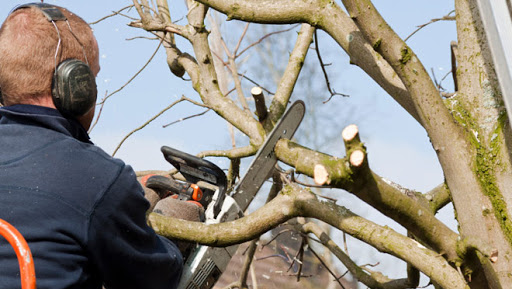Written by Ben McInerney and published on https://www.gotreequotes.com/.
Pruning is the most common tree maintenance procedure. Although forest trees grow quite well with only nature’s pruning, landscape trees require a higher level of care to maintain their structural integrity and aesthetics. Pruning must be done with an understanding of tree biology. Improper pruning can create lasting damage or even shorten the tree’s life.
Why is tree pruning important?

Everyone seems to have a different philosophy on tree pruning. All types of trees benefit from regular pruning.
Tree pruning is important because
– it encourages new growth
– prevents decay
– makes trees more structurally sound
– Is great for the overall health of trees
The fact that tree pruning makes trees safer and increases aesthetic appeal might not be enough to encourage you to prune your tree, so here are a bunch more reasons why you really need to implement a regular pruning program.
The top reasons you need to prune your trees
Now let’s explore why tree pruning is important-
Ensures health: Pruning keeps your trees healthy. Pruning involves removing dead, infected, and excess branches. Proper pruning also allows more air circulation and sun exposure for healthy growth. This promotes new growth, balance, and structural integrity.
Safety: Dead branches can pose a risk to life and property especially during storms. Trees near power lines are also risky. Pruning helps prevent accidents by removing high-risk branches from your tree.
Encourages fruit production: You can prune fruit trees during late winter to promote more growth in spring and summer. When the tree has less volume to maintain, it can put its excess energy stores into producing more fruit.
Appearance: Overgrown trees and hanging branches can look ugly and bring down the curb appeal of your property. Pruning keeps trees in shape and increases the value and look of your property.
More sunlight: Trees can block the entry of sunlight to your home. By clearing the obstructing branches you can allow more light in and save on power.
Growth control: You can control the growth of your trees through tree pruning. You can make a tree easier to maintain this way. Pruning trees in summer generally limits their growth while pruning in winter leads to robust growth.
Improves view: You can prune the branches blocking the view of your windows, balconies, and skylights.
What should be pruned?
What needs to be pruned depends on your objectives-
● Deadwood – You can remove dead and decaying branches to maintain the health of your tree.
● Crossing Branches – When branches grow inwards towards the canopy instead of out, they tend to rub against other branches in the wind causing the bark to sheer off. This can lead to fungal disease or pest invasion.
● Lower branches – Known as a canopy lift, this is a great place to start if you are looking to increase light.
When should you prune your tree?
The ideal time to prune trees is late winter if you want to ensure robust growth. Winter makes the wounds heal faster and ensure less bleeding of sap as the trees are dormant.
You shouldn’t trim trees during fall as your tree takes more time to recover and can develop fungi or diseases.
It’s best to avoid pruning in summer unless you want to reduce the number of fruits or growth of the tree. Fruits trees are annually pruned during late winter to help them grow more fruits.
Spring-blooming trees can be pruned right after they bloom.
Essentially, it boils down on the type of the tree and why you want to prune. So first decide your objectives and then choose the right time to prune.
That being said, you can carry out minor pruning any time of the year. For example, you can remove dead wood, shape canopy, or prune small branches without worrying if it’s summer or winter.
How often should you trim your tree?
It’s best to consider the type, size, and health of your tree to decide how often to trim. Some trees like evergreens can go as many as 7 years without trimming. On the other hand, it is a practice to trim fruit trees once a year during late winter to increase fruit production.
● As a rule of thumb, young trees should be trimmed typically every 2 to 3 years.
● For mature trees, try to trim them once in at least 3 to 5 years.
Pro tip: To save on the cost of tree trimming, opt to have the work done in winter. You will save a minimum of 20% off the price. This is because tree services are quiet during winter and the whole industry becomes very competitive.
Original post here https://ift.tt/2YQUPZl.
from AAA Tree Lopping Ipswich https://ift.tt/3mv40Ya
via IFTTT
No comments:
Post a Comment